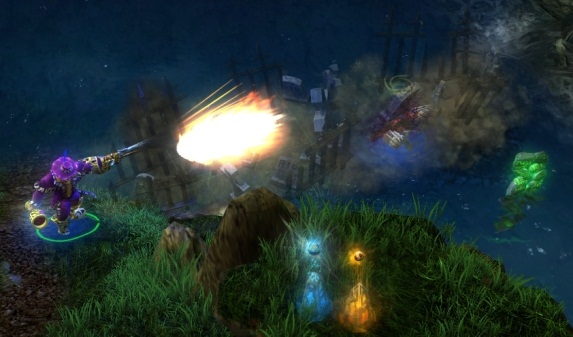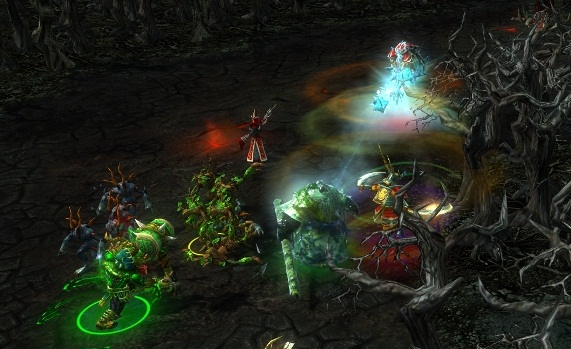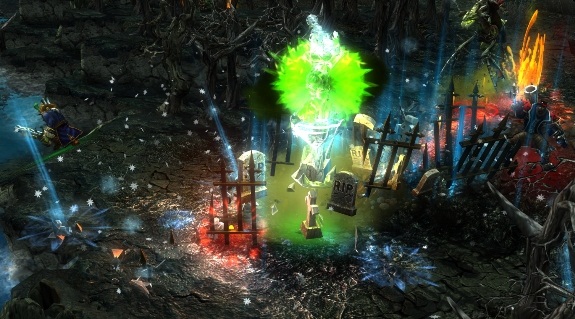Welcome to Part 2 of our Psychology in Heroes of Newerth series! In our last installment about gankers, we discussed the mindset a ganker needs to be successful. Here, in our second installment, we will focus on an oft-overlooked and yet indispensable aspect of a team: the support.
Psychology of Support
Playing 'support' is a tricky role in Heroes of Newerth. Many players are attracted to it because they feel it has less responsibility than other roles; in other words, it's more often the carries and gankers, the flashy heroes whose success or failure can be measured by a body count, who face the blame for a team's loss. However, playing support is not about being relaxed or dull-witted, but quite the opposite. Good support players have to be some of the fastest and sharpest competitors on the field. Why? Because playing support is all about reacting to things. Due to the nature of the role, you are forced to rely on your team-mates and seek synergy anywhere you can find it. Everything you do is a reaction to whatever someone else did: whether in offence or defence, whether winning or losing, from the meanest ward to a full-blown annihilation, you can accomplish nothing without your team.
 Or you just blow some brains out.
Or you just blow some brains out.It’s All in the Reflexes
Basically, you need to be really good at reacting. Hone your senses and be ready for anything. It depends a lot on your support hero: some, by their very nature, allow you a little more time to make decisions and a little more flexibility in doing so. Others, such as Accursed, demand perfect timing and unflinching decision-making. You need to burst heal people from the danger zone immediately to save them, remove stuns the very second they hit and activate your ultimate the moment you face the brunt of the assault. Accursed is only at his best when he acts almost like a robot, doing everything with inhuman timing and awesome accuracy. This may sound impossible, but constant vigilance will allow you to get as close to the ideal of the hero as is humanly possible.
Be Reliable!
The most important aspect of being a support player is reliability. While you might not be entirely independent, you do have a huge responsibility. Many people fail to realize it, but you are the backbone of the team. The utility your hero possesses is what they will need in the time of crisis and this asset is wasted: with rare exceptions, most heroes are 100% useless if they're too far from the action to cast any spells, and having a valuable ability that could potentially have changed the course of the game is pointless if you were too busy farming another lane to use it. Too many players say things like “Oh this game is now out of my hands” or “Oooh I'm a mere support!” Such folly! You are the one holding all the important elements of the team in place. Early in the game you babysit, you build a foundation for the carry to depend on. In the middle game, you assist in all possible ganks, twisting many unfavorable situations into victories for your team. Late game, you provide the map control your team needs to put home its advantage, with heavy warding and by investing in team-wide support items. The support player is the gardener and the team is your garden. Look upon your carry that ravages the enemy heroes, look upon the masses of creeps stomping fallen lanes. You are weak late game, but you should have won the game long before that.
 Yes, this is your fault as well. Noob.
Yes, this is your fault as well. Noob.But if you are too self-aware, it all crumbles. Laning will leave you poor, so don’t try to fight against it. Support items in general are quite cheap compared to what your carry is aiming for and you will be able to afford them at some point. Know your limits, but be ready to help when needed. Be prepared both in mind and inventory, carry around Homecoming Stones to go where help is most needed. Support is not about just buying a set of wards every 6 minutes and throwing it to the rune spot, it is about dedication to your team.
Suicide is Not Painless!
Oh, and then there is this one thing we hate to see support players harp on, the amount of self-pity they throw at us in defense. The idea that support players 'should' die is seriously questionable at best. Yes, self-sacrifice can be necessary, but it is not a rule, merely a contingency. While it is sometimes advantageous to commit near-certain suicide on your team's behalf, you accomplish more if you help your team and live to fight another day. Far too many people take to heart the idea that mindless self-sacrifice is a part of their role. They turn the idea of “I am support, thus I am fragile and will often die because the enemy team will prioritize my death first” to “I am support, so I am allowed to die” and at worst case into “I am support, so I must die.” Martyring yourself on the altar of your own stupidity achieves nothing and helps nobody, so try to avoid doing it.
 This is never worth it. Never. Not even for Captain Flint.
This is never worth it. Never. Not even for Captain Flint.Another issue that many support players have is their own iron-hard conviction that they are useless late game: that after some arbitrary point in time their war is done, the fight one and their obligation to their team at an end. Nothing could be further from the truth. Even if you should reach the point where all of your spells quite genuinely do nothing, you can still help your team, be it through wards, support items, scouting out the enemy and harassing them to disrupt their farm, checking Kongor, or spamming health potions on your team to heal them between fights. Even after the hour mark, there is plenty even the lowliest support player can achieve in a game: the only thing stopping you is your refusal to try.
Supporting is about doing what no one else on the team might not be able to do. What it
isn't about is playing for the first half an hour and then giving up, or dying mindlessly. To master the role of support, you need to be on-the-ball and at-the-ready from the get-go to the end.
In the third part we will be looking into the heads of players who play Initiators, so stay tuned.



